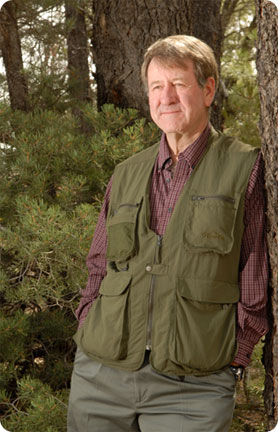By Wally Covington
Regents’ Professor, School of Forestry and
Executive Director for NAU’s Ecological Restoration Institute
Across the western United States, we are seeing an overall trend of wildfire seasons extending in time, starting earlier and ending later.
One factor fueling this trend is severe weather, such as prolonged droughts and increased temperatures, which accelerate the increase in the size and severity of wildfires. This past April in Flagstaff was the 10th driest April on record in more than 100 years. In southern California, the wildfire season began months earlier than usual, with a wildfire in April that burned 44 square miles.
Coupled with extreme weather events are other major trends in forest conditions that contribute to potentially destructive fire seasons. Unnatural fuel loads have been steadily accumulating over the past century. In addition to heavy fuel loads across large landscapes, people and communities are increasingly encroaching on fire-prone lands. This is nothing new to ecologists, but it signals the need to treat large areas of forest in a hurry, through mechanical thinning of small trees coupled with prescribed burning.
All communities throughout the American West are being affected by large-scale, severe wildfires. Compounding the problem in many places is post-fire flooding that taints reservoirs and water supplies of cities downstream.
The full costs of such fires were assessed in a report prepared for the Ecological Restoration Institute by the Rural Policy Institute at The W.A. Franke College of Business. The report accounted the full cost of the 2010 Schultz Fire and found that the total financial impact of the fire and post-fire flood conservatively totaled
$133 million to $146 million. Compared to the estimated pre-fire treatment cost of $15 million, the preventative solution is clear. We cannot afford to do nothing. We must act and we must act now to restore forest health and protect our communities.




